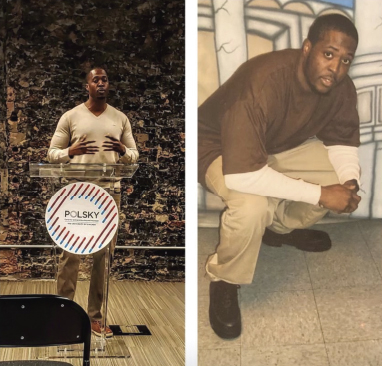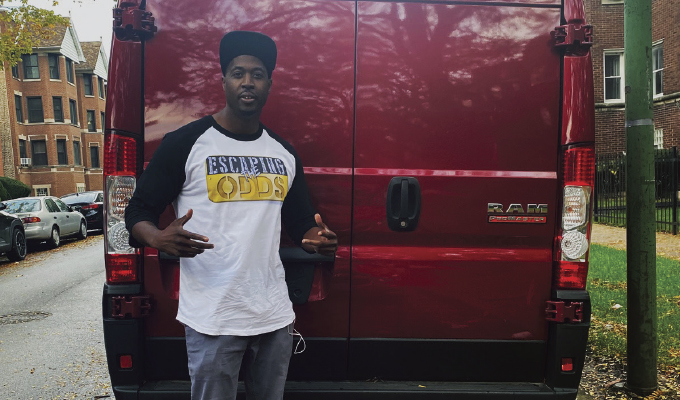Aaron Smith was always interested in business—enough to graduate college with a degree in business management. But growing up in inner-city Chicago among drug culture, Smith ultimately found himself involved in the illegitimate business of drug-dealing. Smith was arrested in 2006 for a non-violent drug offense, and in 2009, he plead guilty to the charges, receiving a 12-year federal sentence.
Smith spent nine years and five months in custody and prepared for his release while doing time. Smith worked dispatch at a large trucking company during his years on bond, so he knew he wanted to work in logistics when he was released. Smith says he knew he could get back into the trucking and logistics industry and find a way to give formerly incarcerated individuals a job opportunity.
Upon his release in February 2019, he used his prior work experience, collegiate experience, and his personal skills to land a job—the exact job he wanted—in the logistics industry. He worked the full-time job for roughly three years, learning dispatch from a broker’s standpoint, which provided the experience necessary for Smith to achieve his goals of helping others find work.
Smith says trucking is probably the number one or number two job formerly incarcerated men want to do after they are released. This is because the barrier of entry is low and the pay is similar to that of what they might have made performing illicit activities. Smith knew people who wanted to get a job in the industry, but they simply didn’t know where to start.

THE COURSE
Wanting to help those with similar life experiences as himself, Smith started his own trucking company. He began hiring formerly incarcerated drivers and offered them the mentorship and knowledge necessary for them to potentially be the owner/operators of their own trucking business.
He extended the mentorship and knowledge sharing when he co-developed a non-CDL truck driving course hosted on the Stretch Finance web platform. He developed the course with the help a friend, Ed Hennings, who is also a former inmate, and owns five box trucks of his own. Smith knew Hennings would be the perfect teacher. The course teaches everything a potential truck owner/operator would need to know to get their foot in the door, from A to Z, Smith says.
The nine-chapter course includes weekly Zoom calls, mentorship opportunities, and even lessons from other professionals in the industry that help educate students on different aspects of the industry. Smith says that recently a representative from a trucking-specific finance software company spoke to the class, sharing their insight on how to keep finances in order and ways to mitigate accounting issues.
Smith says the course basically walks participants through the whole process of learning to drive a truck and acquiring a truck; it provides links to financing options, dispatcher and broker references, and accounting services. There’s also a business planning tool available to course participants with a financial planner that helps students calculate loads and costs per mile.
“On top of the information our course provides, we want to give them real-world examples of what it’s like being a professional in the industry,” Smith adds.
PROVEN SUCCESS
Smith says not only has the course benefited formerly incarcerated individuals, it’s also benefited those that have otherwise been impacted by the justice system.
“We teach them how to start their own trucking company without having a commercial driver’s license,” Smith says. “And we have some success stories thus far.”
Smith mentions one particular individual, Kwante Williams, who spent almost 15 years in prison. Upon his release, he began Smith’s non-CDL trucking course. Smith says the course taught Williams how to book a load, what a dispatcher was, what a broker was—essentially every component necessary to run a successful owner/operator trucking business. When he completed the course, Smith and his team connected Williams with a financing company, a community development fund, out in California that enabled him to acquire a piece of equipment and begin driving for himself right away. Within just three months from beginning the course, Williams was a truck company owner/operator.
“That’s our goal: to take you from not knowing anything about the industry to getting inside a truck and becoming an owner/operator,” Smith says.
Smith began teaching the course in April of 2022, and within that time, he estimates that roughly 50 to 70 students have taken classes. Students complete the course in their own time, and Smith says he tries to keep in touch with the ones that have fallen away, knowing that life happens and other commitments can sometimes take priority in their lives. But although some have fallen away, he says many of them come back.

FINANCIAL ASSISTANCE
The non-CDL owner/operator course is available on www.stretch.money. The course can be purchased for $349. Scholarships are available for individuals interested in taking the course but find themselves in need of financial assistance. Smith says he’s partnered with one organization that was able to supply a number of scholarships to students, and they also have a weekly scholarship giveaway. Smith says they are also looking to partner with other companies in the transportation industry to help provide scholarships and change someone’s life through trucking.
UNTAPPED TALENT
With the current—and growing—driver shortage, no talent pool should be overlooked. Smith encourages fleet owners in need of drivers to connect with him or others like him that are willing to help these individuals reach their goals of becoming truck drivers.
“We’re hardworking,” Smith begins. “Most of us just made some bad decisions. But we’re willing to turn that around with an opportunity.”
Smith says that any company that offers second-chance job opportunities to formerly incarcerated drivers could change the whole dynamics of a family and of a community.
FOR MORE INFORMATION
Those interested in offering a second-chance job opportunity for formerly incarcerated drivers can email Aaron Smith at aaron.esmith81@gmail.com. Smith’s course can be found online at www.stretch.money.




